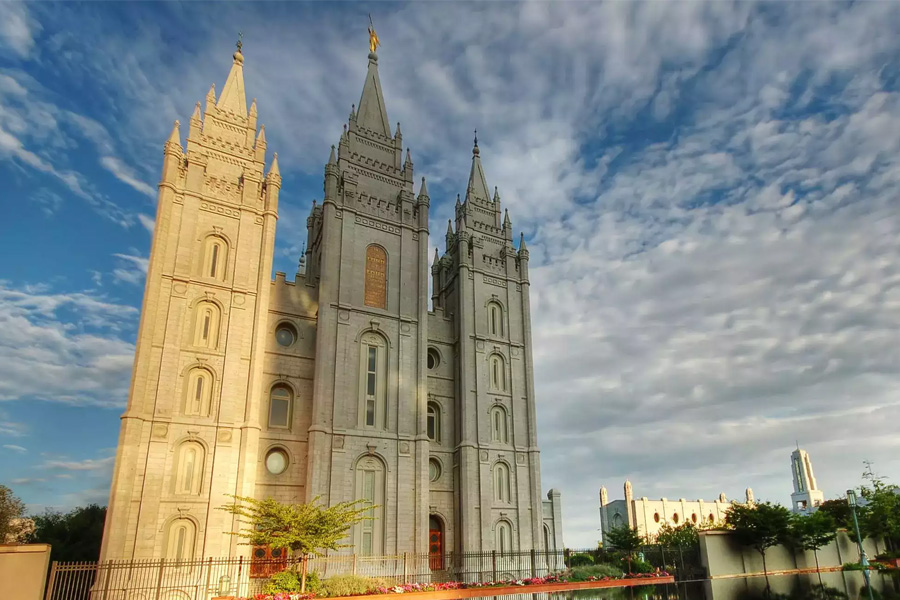Federal regulators on Tuesday announced charges against the Church of Jesus Christ of Latter-day Saints and its nonprofit investment arm, alleging they took measures to conceal the size of the church’s considerable investments, including creating shell companies with phony office addresses.
The church and Ensign Peak Advisors will collectively pay $5 million to resolve the allegations, according to the Securities and Exchange Commission. The agency said the church’s equity investments were valued at about $32 billion in 2018, though a former church investment manager alleged in a 2019 complaint to the IRS that the church had amassed $100 billion in total holdings, including stocks, bonds and cash.
Mormon Church has misled members on $100 billion tax-exempt investment fund, whistleblower alleges
Ensign Peak, which is operated by the Church of Jesus Christ of Latter-day Saints — commonly known as the Mormon Church — allegedly failed to disclose the size of its total equity holdings, as the SEC requires of all large U.S. investment firms. Instead, the agency said, Ensign Peak created 13 shell companies with approval from the church and divided its investment disclosure forms among them. The shell companies were controlled by Ensign and the forms were signed by managers who mostly worked for the church.
“We allege that the LDS Church’s investment manager, with the Church’s knowledge, went to great lengths to avoid disclosing the Church’s investments, depriving the Commission and the investing public of accurate market information,” Gurbir S. Grewal, the SEC’s enforcement director, said in a statement.
Despite documenting over 20 years of efforts to conceal information, the SEC stopped short of describing the church’s activities as fraud, and decided to impose a relatively small civil penalty relative to the size of the church’s resources, said Jacob S. Frenkel, a former senior counsel in the SEC’s division of enforcement.
“They are showing institutional respect for the church,” Frenkel said. “If this had been a private institution, the monetary penalty would have much larger.”
The church confirmed the settlement in its own statement Tuesday, saying that it regrets “mistakes made” and that it was acting on legal advice on how to “comply with its reporting obligations while attempting to maintain the privacy of the portfolio.” Ensign Peak revised its reporting process after it heard from the SEC in 2019 and, since then, has disclosed its investments in a single, quarterly report, the statement said.
The settlement follows the efforts by a whistleblower, former Ensign Peak investment manager David A. Nielsen, to hold the church accountable for how it uses its member donations. In an explosive whistleblower complaint with the IRS, he alleged that the church’s stockpiling of $100 billion in funds, rather than using them for charitable purposes, could be a violation of tax rules. Mormons are asked to give 10 percent of their income to the church, and Nielsen claimed a large portion of these tithings are managed by Ensign Peak investors.
The allegations spurred criticism that the church hoarded money while demanding contributions from struggling families. Others have viewed the church’s fortune as the result of prudent financial management — including Sen. Mitt Romney (R-Utah), who said he was pleased that his church had “not only saved for a rainy day, but for a rainy decade.”
At the time, the church leadership said the complaint was “based on a narrow perspective and limited information.”
After lodging the complaint with the IRS, Nielsen also filed a whistleblower complaint with the SEC, his lawyer, Michael Sullivan, said in an interview earlier this month. If Nielsen’s information was critical to the SEC’s enforcement action, he may stand to collect up to $1.5 million, or 30 percent of the civil penalties the agency collects. Sullivan confirmed Nielsen could receive an award from the SEC but did not say how much.
Securities experts said the type of disclosure in question, called 13F, is designed to give stock market participants transparency about who owns stocks.
Henry T. C. Hu, a corporate and securities law professor at the University of Texas law school, said the amount of information that needs to be disclosed on the forms is fairly minimal, consisting of a list of the securities owned and the types, along with a few other details. Trying to disguise assets by attributing them to multiple shell companies seems like an obvious violation of the rules, Hu said.
“What the law requires is so clear that I am genuinely surprised that anyone would do this,” he said.
The SEC’s nine-page order against the Church of Jesus Christ of Latter-day Saints contains a rare glimpse inside the church’s notoriously secretive financial operations. According to the document, top Mormon officials were worried about the public discovering the connections between the church, Ensign Peak and the shell companies it used to report its equity investments.
In 2015, when senior church leaders feared someone was connecting these dots, they advised managers to “gradually and carefully adapt Ensign Peak’s corporate structure to strengthen the portfolio’s confidentiality,” the SEC said, quoting internal church documents from its investigation.
Ensign Peak’s 13 shell entities were registered to addresses in different cities outside Utah to give the impression they were doing business across the country, the SEC said. However, the agency said no business was done at these places other than collecting mail. Phone numbers for each entity were all sent directly to voice mail; one manager was instructed to notify senior leaders of any voice mails from regulatory agencies, and delete all the others, the SEC order said.
The church’s own internal auditors reviewed Ensign Peak in 2014, and again in 2017, according to the SEC. The auditors highlighted the risk that the SEC might disagree with the corporate filing structure, though it did not recommend any specific changes.
(This news/press release has not been altered by investment.net, apart from the headline, and has been obtained from a syndicated source:- https://www.washingtonpost.com/business/2023/02/21/lds-church-sec-charges/)


